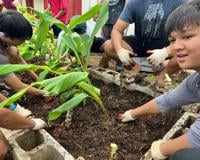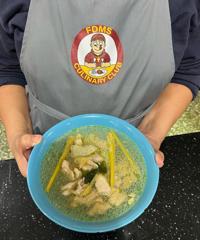FD-180, the Father Dueñas Memorial School Gardening Club, works with the school’s lesson and culinary arts club to promote ecological stewardship and sustainability while redefining the relationship between students.
Cody Lizama, CHamoru’s teacher and one of the FD-180 club advisors, started the club when he was a student at the Mangilao campus.
Diego Camisura, secretary of the Father Dueñas Memorial School FD-180 Gardening Club, gives some lemongrass grown by the club to Mason Taijeron.
“We didn’t have environmentally conscious clubs, farming/gardening oriented clubs, etc., so myself and a few others took the initiative to start something,” Lizama said.
While the club has been around for 12 years, it was about five or six years ago that it launched “farm to fork”, the concept of bringing produce directly from the farm or garden to your table or kitchen, ready to be prepared and/or eaten. .
The term usually refers to restaurants with direct ties to farms, but it can also apply to the use of any ingredient you grow.
In recent years, the club has begun selling its products to the school’s culinary club, which has myriad benefits.
“Lower costs, less pollution, increases small business potential, ingredients are fresher and even allowed to ripen more,” said Aaron Pier, another FD-180 club advisor. “It also connects people to their food, where it’s grown, and the land that sustains us all.”
“A community around the garden”
Tyler San Nicolas, president of FD-180, said he felt a sense of pride when he saw the plants grown and available for consumption.
“One benefit of (farm to table) is that you don’t have to worry about pesticides or diseases getting on your food when you cook it, because you can control the condition of your plants” , said San Nicolas.

Members of the FD-180 Garden Club at Father Dueñas Memorial School plant turmeric and sweet potato.
Today, the club’s ambitions have grown with its factories, with many ongoing projects and different products grown.
Currently, the group grows kamuti (sweet potato), kangkong, pineapple, dragon fruit, and citrus (calamansi and Chinese lemon), among other fruits and vegetables, and is looking to grow more native trees. .
“Students enjoy working with their hands and seeing tangible results for their efforts,” said Pier. “The club brings them out and creates a community around the garden.”
The club teaches students how to grow produce, learn about different types, and various other farm-related activities.
“The club affects me by helping me grow by taking more action and being more responsible for the things that need to be done,” said FD-180 student member Diego Camisura. “Plus, it helped me learn new things about gardening, like how to care for plants.”
FD Culinary Club
While FD-180 grows and sells the produce, the Culinary Club purchases the ingredients and cooks various dishes depending on the harvest, season, and amount grown.
The culinary club pays market price – the current price at which an asset or service can be bought or sold – but it gets fresher produce in return.
“When you buy locally grown produce, you expect to pay market value or sometimes a little more, but you get fresh, quality ingredients that are worth the price,” said Ian Gaza, a sophomore who is president. of the Culinary Club.

The Father Dueñas Memorial School culinary club made chicken tinola, incorporating lemongrass harvested by the school’s gardening club, FD-180.
“We also recognize that the people who grow these quality ingredients do so for a living and have a passion for farming doing what is best and needed for these quality ingredients.”
The culinary club started in August 2021 to bring people who love food together and learn about food, including selling, making and buying, Gaza said.
“We believe everyone should have an outlet to satisfy their sweet tooth,” Gaza said.
He added that the club also teaches members various cooking and financial skills.
“Through our bake sales and our main adviser being the professor of finance, Ms. Rosanne Pleadwell has always emphasized our financial impact and our future,” Gaza said. “She teaches us to create a cohesive unit, with each of us playing an important and necessary role in a smooth sale.”
Learn life skills
Recently, the club made tinola, a Filipino soup, with lemongrass picked directly from the FD-180 garden. Once the ingredients were purchased, they were cleaned, prepared for cooking, then cooked and sold.
“Any remaining part of the ingredients becomes compost, and any unused product is propagated, so we can replant it,” Gaza said.

Diego Camisura, secretary of the Father Dueñas Memorial School FD-180 Gardening Club, gives some lemongrass grown by the club to Mason Taijeron.
“Money from food sales goes into club funds to save for club supplies, food, or activities to improve leadership, team building/bonding, or fun methods of gaining skills. life skills,” Gaza said.
“We generally like to use our money to promote student creativity and education that each of us can use at home,” Gaza said.
“It is an honor to be part of an organization like this. Especially as we learn to explore cooking in a way that is fun for us students. We have the ability to be open-minded and come up with creative ideas for something as simple as what we eat.




